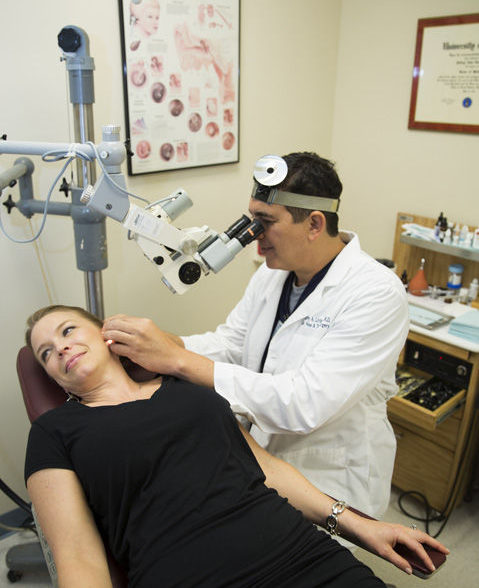
What, exactly, is otolaryngology (pronounced oh-toe-lair-in-goll-oh-jee)? For approximately 60 million Americans suffering from allergies, it may be the last best hope for finding a solution to the sniffling, sneezing, coughing and itchy eyes they know all too well.
For Vero Beach’s Dr. Jeffrey Livingston, it’s about the treatment of those allergies along with other related problems. His practice is positively brimming with the tried and true as well as the newest of the new ways to combat the effects of pollen, ragweed, dust mites, pet dander and all the other things that make allergy sufferers so miserable.
In Florida, allergies often are a year-round state of affairs. “Dust mites are huge here,” Livingston says. “Grass allergies and pollen are also extremely prevalent.” And, given the Sunshine State’s rainy season and warm temperatures, mold can be a continuing irritant for many, as well.
Empathizing with what his allergy and sinus patients are going through comes naturally to Livingston. “I was the kid in the eighth grade who walked around with a box of Kleenex because my nose was always running,” says the gregarious physician. “I had childhood asthma and ragweed allergies.”
What Livingston didn’t know back then was that it wasn’t really the ragweed that was to blame. For him, as for all allergy sufferers, it was his own immune system. Allergies or allergic reactions most often occur when a person’s immune system overreacts to what are essentially harmless elements in the environment.
For example, you might be exposed to pollen by inhaling it, swallowing it or getting it on your skin, and even though the pollen won’t hurt you, your immune system can mistakenly identify that pollen as a dangerous invader and begin producing an antibody called immunoglobulin E.
The Immunoglobulin E then releases chemicals known as “histamines” that cause the actual allergic reactions that 20 to 30 percent of the U.S. population knows all too well. Those reactions can range from a mildly annoying post-nasal drip and watery eyes to potentially life-threatening breathing problems.
Aundrea Haffield, whom Livingston sometimes refers to as his “A-1 allergy nurse,” joins the conversation by saying, “Education is key. Sometimes what people are experiencing isn’t even an allergy.” Her advice? “Get tested, be treated and feel better.”
Seniors in the Vero area face both good and bad news as far as allergies are concerned. Livingston confirms that as we age, our immune systems tend to become less responsive so older individuals frequently lose sensitivity to allergies they once had. Haffield, however, points out seniors “can and do develop [new] allergies” and says, “With a slower pace of life, sometimes the symptoms become much more noticeable.”
According to Livingston, testing with minuscule amounts of suspected allergens such as dander, dust and pollen gives him and other Ear, Nose and Throat specialists a better roadmap to successful treatment. Treatment may then include sinus rinses, medical or surgical procedures, over-the-counter drugs or a variety of “narrowly focused” prescription drugs. Additionally, rather than treating only the symptoms of an allergy, a course of immunotherapy may be undertaken to “sweep away” the root cause of the problem by making the patient no longer sensitive to a particular substance.
Livingston says his practice, “is not solely focused on allergies,” and talks about chronic sinus infections that may be mistaken for allergies along with other conditions he treats. A father of three young boys, he shows his own boyish enthusiasm when talking about his work. “I love what I do. It is extremely rewarding taking care of people from age 0 to 100.”
When asked if he feels the multi-billion dollar over-the-counter allergy medicine industry is trying to put physicians like him out of business with its “take-a-pill-and-go” message, Livingston chuckles. “Well,” he says sitting back and smiling, “I think those over-the-counter medications are actually a very useful part of the arsenal we use to treat allergies. A lot of the time patients have allergy symptoms and they try to manage themselves and we [now] have excellent medications available over-the-counter . . . most of them originated as prescription medications.”
There are three major classifications of over-the-counter allergy drugs. Antihistamines with brand names such as Claritin, Allegra and Zertek; Leukotriene blockers including Singulair, and steroid nasal sprays such as Nasacort. Livingston points out that just this month a new Flonase nasal spray has been approved and is now also on the market.
When commonly used allergy products don’t work, many people seek advice from their primary care physician but sometimes those physicians can be as baffled as their patients. So, they refer patients to Livingston and his colleagues, Dr. Kathleen Baggett and Dr. Alex Yoon at Vero ENT Associates.
Livingston estimates that half his patients come to him by way of physician referrals but in what may be an even stronger endorsement, the next largest group of patients he sees comes from “word of mouth” recommendations.
This being Florida, there is unquestionably enough allergic rhinitis, (hay fever); atopic dermatitis, (eczema); sinusitis, (swelling of the sinuses); urticaria, (hives); mold, pet dander, dust mites and other allergens out there to keep Livingston and Haffield busy testing, treating and making people feel better for years to come.
Vero ENT Associates is located at 1235 36th Street, Suite A, in Vero Beach; the office phone is 772 563 0015.



